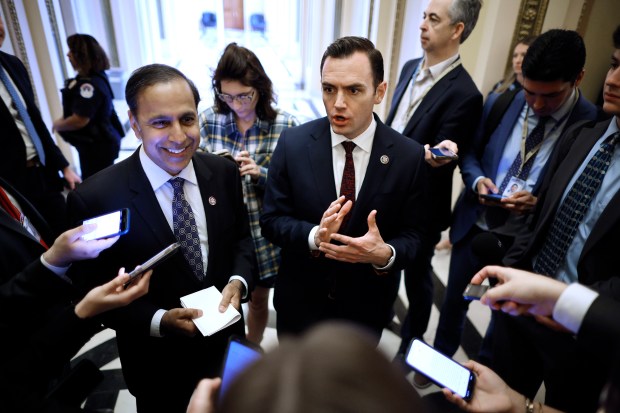There are any number of reasons to despise TikTok, the mind-numbing entity best known not for keeping friends in touch but an endless stream of short-form videos algorithmically tuned with unerring precision to satisfy the tastes of the user. Excessive consumption has become known as “doom scrolling,” a reference to the overstimulated feeling of pointless saturation that has afflicted many a teen and infuriated many a parent.
Over the last week or two, you might have seen mostly risible advertisements wherein worthy folks like medical professionals offer testimony as to how TikTok helped their work or saved lives. Those are part of a massive lobbying campaign by the Chinese-owned advertising juggernaut with 2023 revenue estimated to be $14.3 billion.
TikTok now has reason to be worried. Democratic U.S. Rep. Raja Krishnamoorthi, who represents much of Chicago’s western and northwest suburbs, has had TikTok and its parent company, ByteDance, in his sights for some time. He has joined up with Republican Rep. Mike Gallagher, who represents the 8th District in Wisconsin, to persuade Congress to force the Chinese either to sell TikTok or see it banned in the U.S.
Both men talked to us Thursday, and it’s clear they are making rare, bipartisan progress. The House voted 352-65 for the bill on Wednesday, an overwhelming margin for a chamber better known for its dysfunction than its ability to act decisively on issues of consequence. The administration of President Joe Biden supports the effort, which requires Senate approval before it reaches the president’s desk.
We’re not generally in favor of limiting any American’s choice of what channel to watch, and we’re leery of government inference in any kind of cultural content, even lip-syncing videos. If TikTok, only available since 2017, was not highly effective at what it does, it would not have 1.5 billion global users each month. We’ve heard from those involved in social media that its algorithmic precision is without peer and while we decry the lack of transparency in its algorithm, especially when it comes to kids, that’s also true of other U.S.-based competitors.
A good case can be made that TikTok adds to U.S. divisiveness by amplifying a user’s existing point of view (as distinct from serving up content to challenge their perceptions), thus pushing them closer to the extremes. But in a free society, that’s not a clear reason for a ban. The solution there is better education in critical thinking.
But let’s be clear here: Gallagher and Krishnamoorthi came armed with plenty of very good reasons for Congress to take action, especially since for many young Americans TikTok is not just for fun but a primary source of news.
“TikTok is beholden to and controlled by the Chinese Communist Party,” Krishnamoorthi told us. “Any content critical of the CCP is repressed.” That throttling includes, the congressman continued, anything to do with the freedom of Taiwan, the status of Tibet, the potential Chinese origins of COVID-19 and, of course, anything relating to Tiananmen Square in 1989.
Gallagher noted evidence that TikTok does not have verifiable safeguards in place for its huge trove of user data, opening users up to blackmail or espionage, given how much TikTok knows about their tastes and proclivities.
We have a precedent for the TikTok legislation in the previously discrete dating app Grindr. After Beijing Kunlun Tech acquired majority ownership of Grindr in 2016 with no clear data protections offered, the U.S. government determined there was a serious blackmail threat from ownership by a foreign adversary, especially given the app’s popularity with LGBTQ+ persons. Under U.S. pressure, Grindr was sold to a California-based investor group in 2020.
Gallagher called the TikTok situation a “smokeless battlefield.”
Both men noted several times that China’s own citizens cannot access TikTok, another clue its raison d’etre is not just revenue but overseas political manipulation.
“You can’t regulate the CCP,” Krishnamoorthi said, in answer to our question about whether changes could be demanded as a compromise.
And we had no argument for that.
The rules involving foreign ownership of U.S. media outlets are contested, complex and shifting. But it’s fair to say that non-U.S. entities seeking media control (or control of key U.S. infrastructure) always receive far more scrutiny from the Federal Communications Commission and other government regulators than has TikTok, even though the latter now has far more users and wields far more influence than a run-of-the-mill local or cable channel.
The two men from each side of the aisle convinced us. Bytedance has to sell, and go. And any new owners have to put transparency and data protection first.
Submit a letter, of no more than 400 words, to the editor here or email letters@chicagotribune.com.





